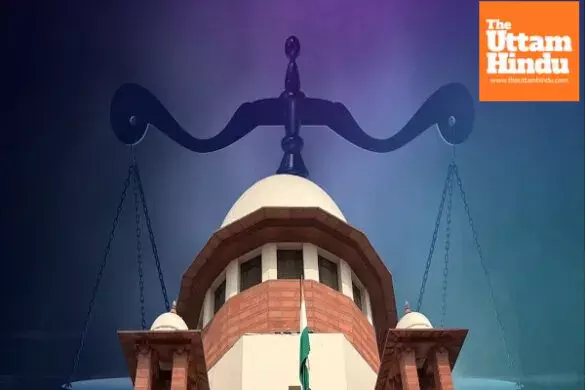Centre Argues: States Cannot Challenge President or Governor's Decisions in Court

New Delhi (The Uttam Hindu)- The Central Government clarified in the Supreme Court that the state governments cannot file a writ petition in the Supreme Court claiming violation of fundamental rights against the decisions of the President or the Governor on the bills passed by the Assemblies.
Solicitor General Tushar Mehta, appearing for the Central Government, said this before a five-judge Constitution Bench headed by Chief Justice (CJI) BR Gavai. The Constitution Bench also included Justice Suryakant, Justice Vikram Nath, Justice PS Narasimha and Justice AS Chandurkar. Mehta said that the President wants to take the opinion of the Supreme Court on whether the state governments can file such petitions under Article 32 of the Constitution. He also said that the President also wants to know what is the scope of Article 361 of the Constitution. This article says that the President or the Governor will not be answerable to any court for the discharge of their powers and duties.
The Constitution Bench is hearing the Presidential Reference related to the jurisdiction of the President and the Governor to decide on bills. Solicitor General Tushar Mehta said that through this reference, the President wants to know the opinion of the court on two questions. Mehta told the Constitution Bench that these questions have been discussed earlier as well. But the President is of the opinion that a clear opinion of the court is necessary, because such a matter may arise again in the future. He said that under Article 32, a petition challenging the decisions of the President or the Governor on behalf of the state government cannot be accepted. Neither can the court give any direction in such cases nor can these decisions be challenged in the court. He further said, Article 32 is used when fundamental rights are violated. But in the constitutional framework, the state government itself does not have fundamental rights. The role of the state government is to protect the fundamental rights of its citizens. The Solicitor General also referred to its April 8 judgment in which the Supreme Court had said that if the Governor does not decide on the bills within the time limit, the states can directly approach the Supreme Court.
It is not right for the Governor to keep the bill pending for six months: CJI
On this, CJI Gavai said that he would not comment on the decision of two judges of April 8, but also said that it is not right for the Governor to keep a bill pending for six months. Mehta replied that if a constitutional institution does not perform its duties, it does not mean that the court should order another constitutional institution. On this, the CJI said, yes, we understand what you are saying. But if this court itself does not resolve a matter for 10 years, will the President have the right to give any order? The hearing is still going on. On August 26, the Supreme Court had raised the question that if a Governor does not take a decision on a bill indefinitely, will the court have no remedy? Can important bills like the budget also get stuck due to the independent power of the Governor? The apex court raised this question when some BJP-ruled states said that the Governor and the President should have complete freedom in taking decisions on the bills. These states also said that the court cannot be the solution to every problem. The Supreme Court is currently hearing a constitutional reference sent by the President, in which it has been asked whether the court can direct the Governor and the President to take a decision on the bills passed by the Assembly within a fixed time frame? In May, President Draupadi Murmu had sought the opinion of the Supreme Court under Article 143 (1) whether the court can direct the President to decide when and how to take a decision on the bills passed by the state assembly.
